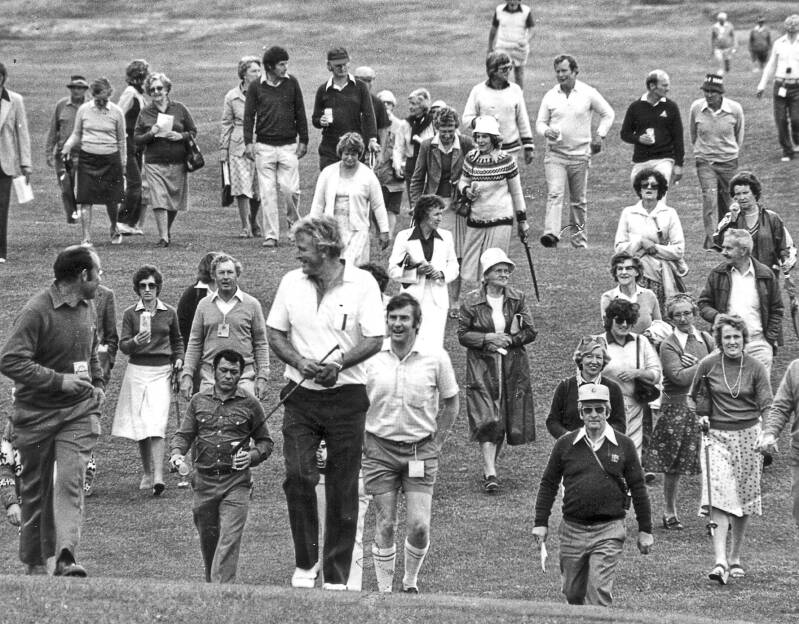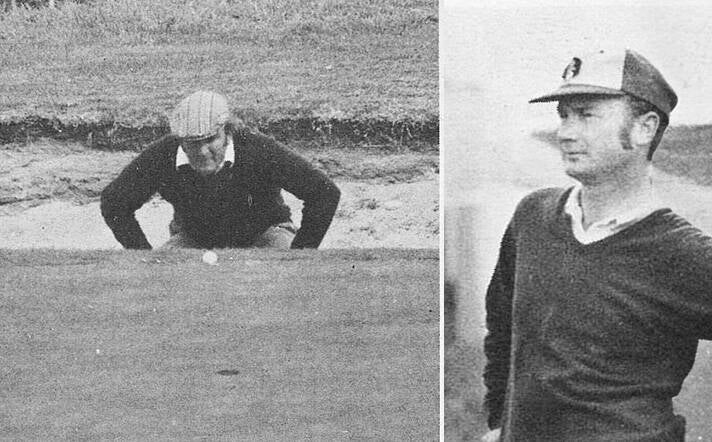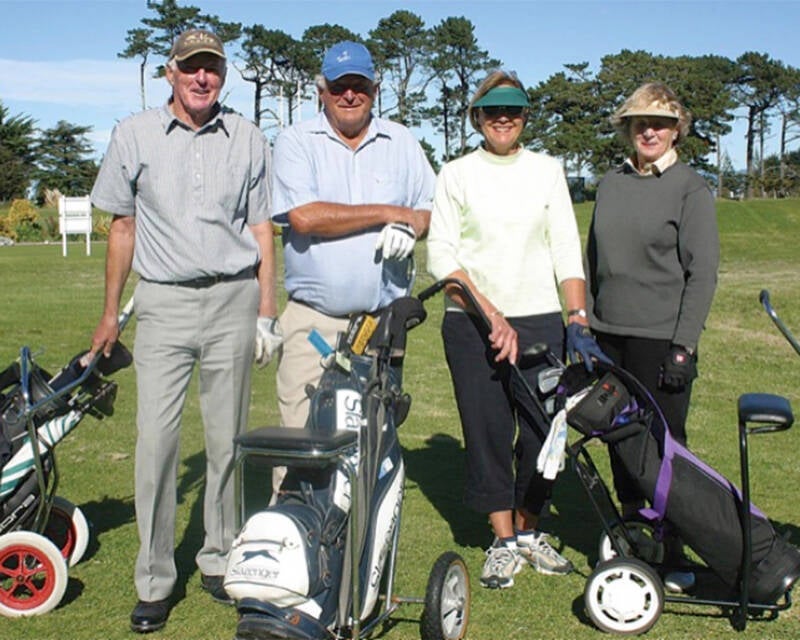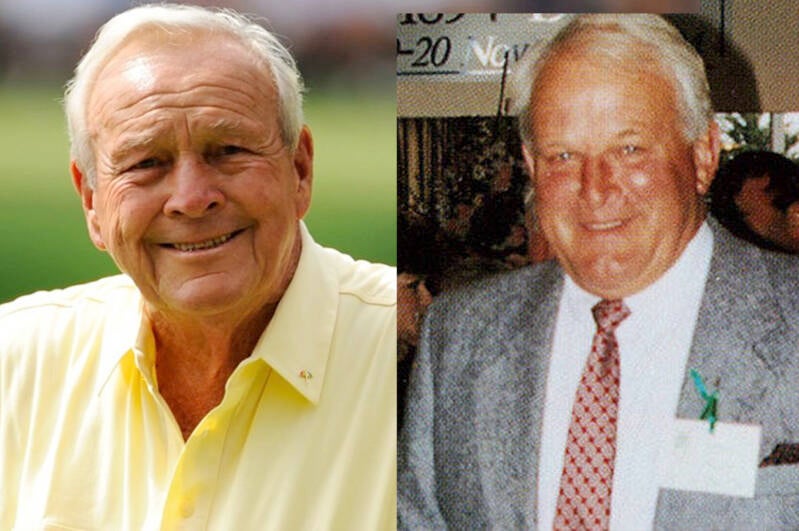The Golfer
Written for Beachlife magazine in 2010
The term "living legend" is often over-used these days but in some instances the description is apt. Never more so for one man who lives amongst us—the Wainui Beach man who can best be described as "The Golfer". He is in fact a man of many skills but Peter Rouse gained his legendary status predominantly via his talent at the sport of golf. In his prime he played with and against the best amateurs in New Zealand. Some say he could have gone on to play professionally and could have competed at international level. However he chose a country life and lived out his working days as a respected East Coast hill country farmer inland from Te Puia Springs and played his golf locally – confounding, as well as inspiring, most who came up against him on the district's golf courses over the past 60 years. At 73 years he is still considered a threat to opponents of all ages who shake his hand on the first tee at any local tournament. This then is a look at the life of Peter Rouse—The Golfer. Much of the information for this story was supplied by Peter's older brother, Dr John Rouse.
NOTE: This story was written before Peter Rouse's untimely death in 2012 and refers to him as still with us.

Above: Peter Rouse waiting to tee off in the Te Puia Hot Springs East Coast Golf Championship in 2009. When I wrote this story for Beachlife magazine in the summer of 2010 Peter Rouse was still very much alive. He was killed in a quad bike accident on his son's farm near Tokomaru Bay two years later in January of 2012 aged 74.
Peter Duncan Rouse. For those who know him, a living legend. Like all of us he owes his beginnings to chance, luck and circumstance. In the world of golf Peter's prowess was shaped by events, the most important was the 1945 formation of the Te Puia Springs Golf Club. His East Coast farming parents, Ellis and Nell, played leading roles in setting up this picturesque country golf course, which became a winter sporting and social haven for the people of the district, on a plateau of farm land near Te Puia Springs, commanding views of Mount Hikurangi and the sea out from Waipiro Bay.
As parents and keen golfers the senior Rouses would travel down from the farm to play at the Te Puia Springs golf club every Sunday. Their three children were left to "mess about" with old golf clubs, balls wrapped in sticking plaster and tees made from matchsticks. At the age of 8 Peter remembers being taught how to swing a golf club by club member and East Coast farmer, Freddy Jefferd. He says he has never really varied the technique of that swing to this very day.
By age 14 in 1950 he was boarding at secondary school in Nelson. Back on the farm for the August holidays a mishap resulted in the need for a bone chip to be removed from his right elbow. Bill Park, orthopedic surgeon, forbade rugby. In its place Peter and three school friends would bike every Sunday afternoon, carrying bags of clubs over their shoulders, to the Nelson Golf Club's Tahuna links where they were junior members. He quickly reached a single figure handicap which he has maintained for 60 years. Home again for holidays Peter played in his first East Coast Open Championship that year.
Despite "doctor's orders" Peter did play rugby again in his final year at college and a few years later, back on the family farm near Te Puia, he was selected to play for the East Coast, only to be sidelined by a leg injury. Father Ellis put his foot down and decreed: "There's no future for you in rugby. You are going to be a golfer".
In his prime Peter played with and against the best in New Zealand, either beating or scaring every name in amateur golf. His first outing with the Poverty Bay East Coast Freyberg Rosebowl Team against Auckland, at Otago's Balmacewen in 1962, saw him take a win and a half on the first day. And in the 1981 interprovincial, at Poverty Bay, he recorded four wins while playing at number one. With Eric Gordon he was a runner-up in the 1967 New Zealand Amateur Foursomes.
A time-line of Peter Rouse's golfing dominance is written in gold paint on the honours boards of the golf clubs of this region. At Te Puia, his home club for most of his younger life, he won the East Coast Open Championship ten times, the last occasion in 2001 aged 63. He held the club's senior championship for a total of 26 years.

Peter Rouse leads a gallery of local supporters during the 1981 Freyburg Rosebowl.
He held the coveted title of "King of the Coast" by winning the Tolaga Bay Open Championship eleven times. He won the Poverty Bay Open Championship five times. While Peter marched down the fairway of life as a winner on most occasions—gaining a reputation as a tough competitor on and off the golf course—he was also a man known for his generous spirit, happy to give advice if asked and always interested in the progress of fellow golfers of all abilities.
Just as important as his success at competition was the effort he put back into the game. With a natural talent for coaching and correcting a fault in a player's swing, Peter encouraged many young people into golf, helped older players having difficulties with their games and has been a mentor for many with outstanding talent—being rewarded with some exceptional outcomes. He has also served in the voluntary administration of both the Te Puia and Poverty Bay clubs.
A born leader and a man of charisma he is universally well liked for his excellent company and good humour. He is often called upon to make the closing speech at formal events or to come up with heartfelt words at celebrations and milestone occasions.
His success in life, according to his brother John, is the result of disciplines instilled in great part by his parents, Ellis and Nell.
Mother Nell, was born in Manchester, England. With her mother and one brother she arrived by sailing ship at Tokomaru Bay in 1912 at three years of age, there to join with her English immigrant father who had found work as a teamster on the 10,000 acre Ihungia Station, just north and inland from Te Puia Springs.
Father Ellis was born in Nelson, the son of a Motueka farmer, and in the late 1920s followed in the footsteps of an older brother to become a shepherd on Ihungia Station, almost certainly upon the strength of having had an uncle teaching at Waipiro Bay Primary School.
Ellis and Nell met and married and worked hard to eventually become farmers and landowners in their own right. John Rouse was their first child. Peter was the second son of the union, born at Tokomaru Bay, to be followed by two sisters, Judith and Gillian. Home was by then the family station "Kiteroa" ('long view'), 3½ miles along the Ihungia Road, and rising to 1500 feet with a distant view of the Pacific Ocean.
There was plenty to occupy Peter in his childhood days from working at household chores to being an honorary sheepdog. Trips to town in those days meant the precarious drive with his parents down to Waipiro Bay which was then a thriving settlement with shops, a theatre, snooker halls, wool stores and hotels. In an earlier time along this route his grandfather, the wagon driver for Ihungia Station, drove himself, his horses and a wagon full of Christmas supplies over a bank to his death on a fateful Christmas Eve.

Peter Rouse on his way to a win over Eric 'EJ' Gordon (right) to take the 1975 Poverty Bay Open Championship.
Peter's education was at first correspondence school with his mother as teacher and he then followed his siblings to a nearby remote country school at Tuhua in the Takapau Valley, attending from standard one through to six. The daily routine meant being dressed by 7am to catch and saddle "Lucky" before breakfast for the three-mile, one-hour ride to school on a horse who could be difficult to catch in the morning but by 3pm was champing to get back to the farm.
Older brother John, had like experiences on "Tarzan", on long-term loan from Tommy Harris, an itinerant Kiteroa farm worker, overseas on service during WWII. He says the white winter frosts of the Takapau Valley, where nestled Tuhua, bit hard into the shoeless and short-pantsed riders, but such discomforts were taken for granted.
With a roll of 24-30 pupils and a sole teacher, playtime pursuits included longball, hopscotch, cowboys and indians and summertime swims in the nearby creek—team sports negated by the diverse age range.
"The teachers of the era, who had to deliver education across several age group classes, must be highly commended for providing a sound basic education. "A disadvantage was that small, sometimes one-child classes, made it difficult to assess one's scholastic prowess. There were delegated responsibilities including starting the open fire during the winter term, where in general the class room really only warmed up by home time. And after school on Fridays the two most senior students became day cart boys—the clay subsoil being hard digging, the reward five shillings each at the end of each term supplied by the school committee. Big money in those days."
As secondary schooling beckoned John was given the Hobson's choice of attending Nelson College, never to be regretted: "The attractions included a grandmother living at nearby Richmond, father Ellis being was born in the region and in 1947 the cost of board at Rutherford House (named for old boy Sir Ernest Rutherford, the scientist who split the atom) was but £5 per term."
Peter was to follow John to Nelson in 1950. The shock of transforming from the rural East Coast school to a college of 600 students was made easier by friendships developed with many other boarders from the Gisborne district.

If it works, don't change it: Peter Rouse was formidable with a putter for half a century.
"The three-times-a-year routine was to travel by car to Gisborne, train to Wellington station, walk to the ferry wharf, sail overnight by SS Aruhura to Nelson—Cook Straight, classed the roughest crossing in the world—taxi to school, eat breakfast, attend assembly and then into the classroom."
Upon leaving school Peter went on to make a career in farming, first for two years as a shepherd at Paparatu Station inland from Manutuke, on a 14,000 acre block managed by Trevor Horton, also a keen golfer and member of the Poverty Bay Golf Club. Fellow shepherds included Mick Allan and Tony Armstrong. Then there was a move to head shepherd at Tangiwai Station, out of Wairoa, at which he arrived by riding the inland road with his team of dogs. During this time Peter played what golf he could at Poverty Bay and then at the Wairoa Golf Club.
1960 saw him back on the Coast to set up permanently at Kiteroa in partnership with his father and to take over the property on his parents' retirement in the mid-1970s.
In his first few years as a bachelor farmer living on the remote East Coast, Peter would often travel to Gisborne for tennis or golf events and one weekend, while socialising with friends in Pare Street, Wainui, he spotted a "pretty girl down on the beach wearing a blue bikini".
After "keeping an eye on her" for a number of years he eventually (in 1965) married Dorothy Rose Wallis, a farmer's daughter from Te Karaka. Brother John says it proved to be a stable and loving relationship—the popular couple individually and together noted for their generous hospitality, along with consistent care and devotion to family and friends.
They have two sons and a daughter. Mark, a Taupo landscape gardener, and Lorraine have school age boys, Jack and Charlie. Johnny manages Mangatarata, a high-country sheep and cattle station on the Mata Road, just south of Tokomaru Bay; he and Kirsty have three children, William, Tom and Ella, all pre-schoolers. Daughter Lills is a registered nurse, recently working at Hastings Hospital; she and Nick have even more recently become parents of George.
As a successful farmer—with strong support from Dot—Peter took a major interest in community affairs, a trait inherited from his parents. He held positions of president of a Young Farmers district, the Ruatoria branch of Federated Farmers, the Te Puia Golf Club and the Ruatoria Lions Club. He became vice-president of the Ruatoria A&P Association at the age of 32 followed by two years as president, overseeing two very successful shows. He had terms on the Waiapu Hospital Board and, following amalgamation, was an inaugural member of the Tairawhiti District Health Board.
Importantly, Dot and Peter also concentrated on giving their family good starts in life. The children were organised for the nine-mile daily journey to Te Puia Primary School from Kiteroa, Tuhua having long since closed. There followed a logistical need for the children to attend boarding schools at secondary level.

No less than five bridesmaids and five groomsmen for Peter Rouse's wedding to Dorothy Wallis in 1967.
In the 1940s, when Peter was a child, the 70-mile trip from Te Puia to Gisborne—at no faster than 30mph—was an arduous journey for the Rouses of Kiteroa. In this era, with land newly-developed along the seafront at Wainui Beach, it was the trend for the district's hill country farmers to buy cheap beach properties and build simple "baches" in which to stay overnight on trips into town.
In 1946, and £50 later, the senior Rouses purchased a bare section atop the dunes along Wairere Road fronting the ocean. The resulting bach on the property was a converted garage from a motor vehicle repair business which became a town base where family and friends could stay overnight after school dances, tennis tournaments and other social and occasions.
"The idea of too much of a holiday was generally tempered by working on the section, painting the building, digging the garden, cutting the grass, with just a little time for sun and surf," remembers Dr John.
As the Rouse brothers grew into young men and, due mostly to Peter's love of good company and his all-round conviviality, by the late 1950s the bach at 111 Wairere Road became widely known as "The Rouse Cabaret".
The cabaret days lasted for 15 years or so but all parties eventually come to and in 1975 the bach was demolished and replaced by the a residence of substance, built as a retirement home for Ellis and Nell.
While Peter followed his passion for golf predominantly at the Te Puia Springs course with trips into Gisborne for major events, sheep and cattle farming took first priority until the mid-1990s when a decision was made to sell Kiteroa to forestry. Peter and Dot came to town and moved into the Wairere Road family home where they have resided since 1995, upgrading part of the house to take bed and breakfast overnighters.
Upon arriving in Gisborne, Peter continued his commitment to golf, joining the Poverty Bay Golf Club. He became the junior development officer for golf in schools, before passing the job on to Kirsty Sharp in 2000. From 2000-2007 he was president of the Poverty Bay Golf Club. From 2005-2007 he was the Poverty Bay East Coast delegate to the Council of New Zealand Golf. Over the years Peter has received impressive and justifiable awards and acknowledgement, including a Life Membership of the Te Puia Golf Club. In 1998 he received the Air New Zealand Eastland Sports Award "for his contributions in the sport of golf". In October 2008 he received the highly-prestigious Civic Citizen's Award, for his services to golf and the community.
Peter will no doubt be a little embarrassed by this article's attention and shies away of remarks that he might be the region's best golfer in living memory. He says long-time friend and golfing adversary, Eric "E.J." Gordon, has a stronger claim to that accolade. He also remembers with admiration older golfers like Eric's brother Frank Gordon, Roly Field and Bowser Toogood who were the "legends" of their day.
At 73 Peter Rouse is hardly retired. In his alias as 'The Lawn Ranger', he runs a busy lawn mowing business and continues to play golf as and when the grass stops growing. Just seven years ago, in 2003, in his mid 60s, Peter was playing off a +1 handicap following a six month period where he played Poverty Bay par or under 11 times, including two rounds of 68 and one of 69. Three years ago he shot a round of 70 at Poverty Bay, to equal his age.

Even as he approached the last years of his life Peter Rouse's swing
was still a thing of beauty.
Today, he has crept out to a course handicap of 8 and while still in the top six percent of New Zealand golfers, he is hard on himself as he curses the ruthless reality of advancing age. Arthritis around that chipped bone in his elbow is finally interrupting the rock-solid golf swing he has maintained almost perfectly for six decades.
Yet, despite protestations to the contrary, he refuses to lie down, entering the major local tournaments at Te Puia, Tolaga Bay and Poverty Bay (championship events that he once held the mortgage on) and enjoying each match he plays for its own merit. Most local golfers are aware of the icy stare he delivers with his piercing blue eyes when he decides you are the target to "gun down" on any given day, no matter what the stakes are.
He plays on with the humble knowledge that the top young players of today are wary of him still, that tournament organisers rely on his charisma in and out of the club house, and that players of all abilities get a huge thrill should they get to play with or against him.
One thing all local golfers know is that he is, and will be, hard act to follow.

Peter Rouse and his brother Dr John Rouse playing with their wives Robyn and Dot.

Not a lot of imagination is needed to compare the look and demeanour of Peter Rouse with the great Arnold Palmer.
POSTSCRIPT
(Excerpt from The Gisborne Herald, January 31, 2012)
An East Coast golfing identity died after a quad bike accident on a Tokomaru Bay farm at the weekend.
Peter Rouse, 74, was with his son and other family members on a Mata Road farm helping to muster on Saturday afternoon. Police say the group had stopped at a hilltop to review their day's work at about 4pm.
Senior Sergeant Moera Brown said when the group decided to turn back to the homestead Mr Rouse's bike went forward instead of backwards down a steep bank.
The bike rolled several times over Mr Rouse as it tumbled 20 metres down the bank.
Senior Sgt Brown said the incident would be referred to the coroner. The Department of Labour would also investigate.
As a golfer Mr Rouse first turned out for the region in 1962. He honed his golf swing at Te Puia Springs on a course his parents had helped develop in the late 1940s.
Over five decades he won the East Coast Championship 10 times, the last occasion in 2001 aged 63. He was also a long time Freyberg Rosebowl team member and had won the "King of the Coast" title 11 times by taking the Tolaga Bay Open.
Friend and fierce Poverty Bay rival Eric Gordon said the pair would often joke about who was the better golfer. "He said me, and I always said him. He was certainly a legend all right."

Family, friends and fellow golfers farewelled Peter Rouse at his funeral at Holy Trinity Church, Gisborne, 2012.